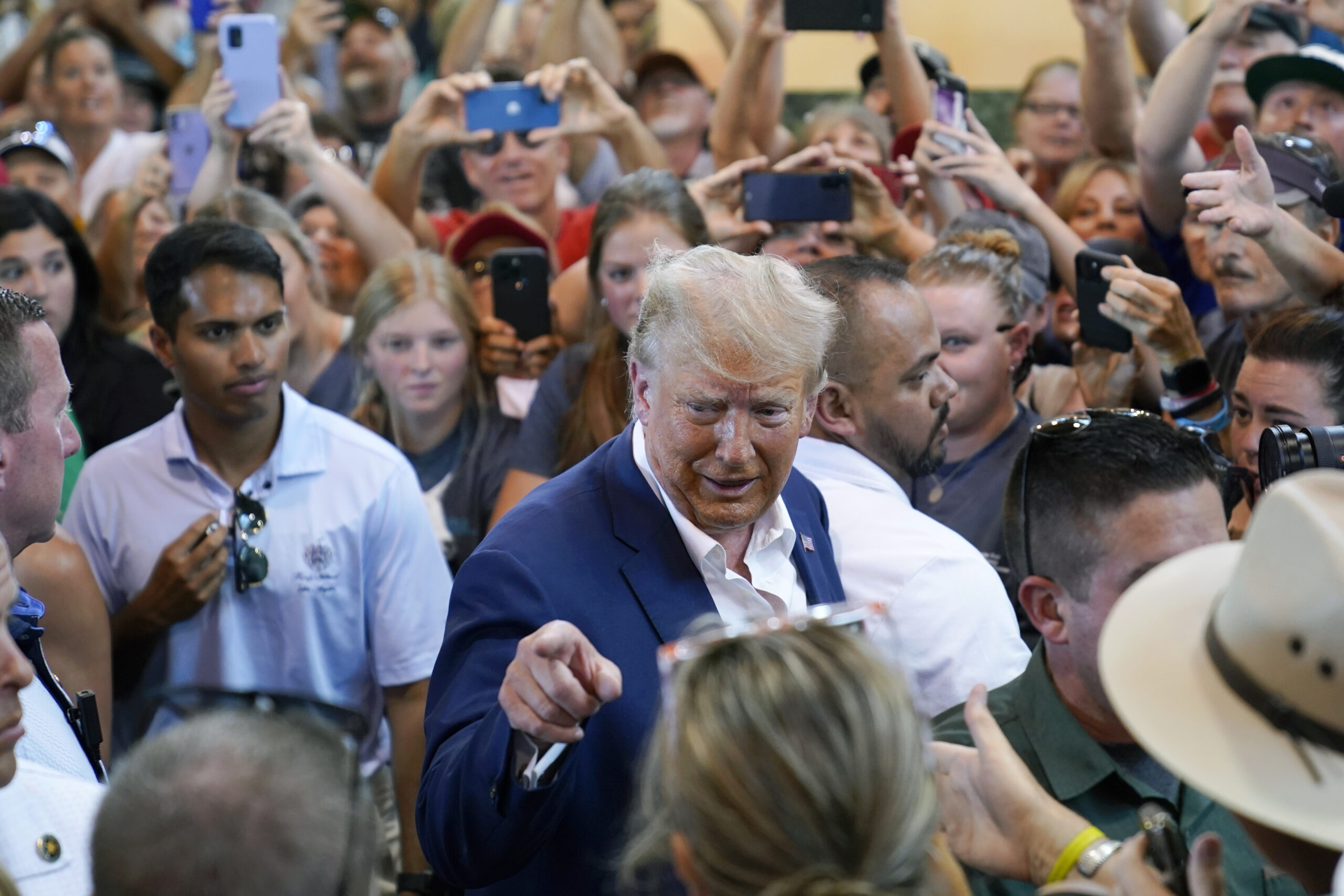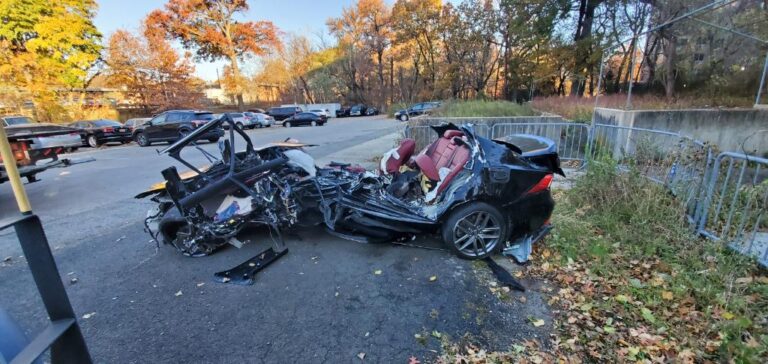The loop Donald Trump’s private jet made above the Iowa State Fair before his visit last weekend was more than just a gesture to the hundreds of supporters — and a few rival candidates — on the ground. It was a reminder that the four-time indicted former president casts a Boeing 757-sized shadow over the race for the 2024 Republican presidential nomination.
That’s where agreement about Trump seems to end. With less than five months before Iowans cast the first votes in the GOP contest, conversations with more than 40 Republicans at the time-honored presidential campaign ritual suggest the party is far from unified on much of anything else.
Most voters say that until the winter chill sets in, they’re keeping an open mind, honoring the state’s tradition of vetting all candidates. Still, many GOP voters say they can’t help but weigh their intense feelings about Trump as they consider their choices.
In line to view the life-sized cow sculpted from butter, around booths selling deep-fried Twinkies and Oreos and throughout this annual tribute to Midwestern agriculture, some Republicans who plan to attend the Jan. 15 caucuses said they will support Trump even if he’s a convicted felon. Others are just as adamant that the time has come to pivot from the figure who reshaped their party.
Many are conflicted, yearning to turn the page but not disowning the former president. They like what he did in office and support his policy priorities — and yet they worry that what they view largely as political persecution could hobble him both as the Republican nominee and as president.
“President Trump – he’s just got a lot of distractions, and you know his bedside manner’s not good,” said Des Moines Republican Frank Miller, who was excited about the candidates he heard from at a barbecue stop near the animal barns.
“There’s a lot of people in this country that think that’s more important than the policy,” added Miller, who works for an insurance company and is undecided on whom he’ll support. “I’m not one of those.”
Loyalty to Trump runs deep in Iowa, a state he comfortably carried twice and where he is the heavy favorite in early polls for the Republican caucuses. Still, it’s apparent from talking to voters that already-complicated assessments of Trump could shift during months of televised debates, relentless advertising and more intense campaigning — never mind court proceedings in the series of criminal indictments he faces from New York to Florida.
And GOP voters in this predominantly white, largely rural state are paying attention.
The only circumstances that would keep Connie Lamberti from again supporting Trump in the caucuses are his withdrawal or a physical ailment that makes him unable to run.
Not on her list: a conviction in any of four criminal indictments Trump faces. Lamberti thinks they’re all politically motivated.
“I believe I would still caucus for him,” said the 70-year-old retired communications administrator from Ankeny while attending a candidate interview series led by Iowa Gov. Kim Reynolds. “I believe it’s intentional on his opponents’ part.”
Trump’s brief Aug. 12 stop at the fair only stoked his celebrity status. He waved a porkchop as he waded through a crush of fans and media. He introduced Florida U.S. House members who had endorsed him, a shot at Florida Gov. Ron DeSantis, a 2024 rival who was touring the fair with his family.
It was a sign of Trump’s staying power with Republicans, and the headwinds competing candidates face, that even Iowans open to Trump alternatives are waiting to see them prove themselves.
But a recent New York Times/Siena College poll in Iowa shows candidates other than Trump have room to grow. Close to half of potential Republican caucus voters backing Trump say they’re open to other candidates, while only about 3 in 10 of those who don’t choose Trump say they would consider supporting him.
Plenty of fair-goers were happy to identify qualities they like in the others.
Voters say DeSantis has a strong record on GOP priorities; former Vice President Mike Pence is a solid conservative and a decent man. South Carolina Sen. Tim Scott displays integrity with an upbeat style. Businessman Vivek Ramaswamy, whose rap to Eminem floored fairgoers, has a youthful appeal. And former U.N. Ambassador and South Carolina Gov. Nikki Haley has a common touch and global experience.
Trump will not be able to count on Republican Abbey Sindt, a 37-year-old mental health nurse from small-town Story City. She voted for Trump previously but was at the fair in part to size up Pence.
“The Republican Party has changed,” she said, seeking shade near a livestock barn. “And there are reasons. It’s because Trump has become a distraction, and not a healthy distraction.”
Yet, even some voters who are weighing alternatives say they might end up backing Trump on caucus night.
Keith Hoksbergen grabbed Scott’s campaign signs from the Iowa Republican Party’s booth, but the 65-year-old factory worker from Pella says Trump and others remain options.
Hoksbergen sees Trump as imperfect but tested. He attributes concerns about Trump’s viability to what he views as news media bias. “It’s only the negative stuff that everybody talks about,” he said. “I look past a lot of that.”
Wesley Rose, a corn and soybean farmer in the Mississippi River valley, views the former president as a friend to agriculture. In his mind, the need to oust President Joe Biden eclipses other concerns.
“There are some things that he says that ain’t right, but I just don’t like what’s going on with Biden right now,” said Rose, 53, of Clinton, adding “time will tell” who he’ll support.
It wouldn’t be the first time animosity toward Biden and the Democrats led Republican voters to swallow concerns about their own candidates. In the 2022 midterm elections, most GOP voters who didn’t consider themselves fans of Trump-backed Republican candidates, were motivated by opposition to the Democrats.
Just as some Trump skeptics remain open to him, longtime die-hards like Bob Heckert said the weight of what he called unfair prosecutions — not Trump’s alleged acts — had rendered him too politically damaged.
“I don’t think he can get elected,” Heckert, a 72-year-old retired Ottumwa maintenance engineer who had supported Trump previously, said after viewing the butter cow. “There’s so much controversy against him, prejudice I guess you might want to say, that I don’t think if he did happen to get elected that he could accomplish anything.”
Trump’s actions after his 2020 defeat were too much for some voters.
“Jan. 6 was absolutely horrible,” said Bob Stephany, a 61-year-old Council Bluffs salesman and former Trump supporter, as his family was buying ice cream. The 2021 insurrection by a mob of Trump supporters “stained everything that was positive, and there were lots of positive things in his presidency,” Stephany said.
Those interviewed praised Trump’s record in office, many noting his success seating conservative Supreme Court justices who helped overturn the landmark 1973 abortion case, Roe. v. Wade, last year.
Others cited his move of the U.S. Embassy in Israel to Jerusalem, a long-sought goal of evangelical Christians. His effort to build a wall along the U.S. border with Mexico, even if he didn’t complete it, is viewed by many as evidence of Trump’s commitment to stemming illegal immigration.
But Trump’s divisiveness was also frequently cited, including by some who praised his record. The need for healing is reason enough for some to move on.
“I don’t think he represents the values personally that people can get behind,” said Barbara Collins, a 67-year-old financial adviser from Bellevue. “And I think his ship has passed.”
As Samona Yentes’ friends awaited her at the Dairy Barn, Yentes wavered.
Yes, she conceded, it’s possible that Trump’s time has come and gone. But the former president of Iowa’s leading anti-abortion group quickly pivoted, expressing astonishment that Trump is still “going out and fighting the battle.”
“That’s the part of me that goes, he’s kind of unstoppable,” she said.
So where does that leave her heading into the fall campaign?
“I haven’t landed,” she said. “And I’ve got five months to think about it.”
(AP)











